Related Research Articles

Honduras, officially the Republic of Honduras, is a country in Central America. The republic of Honduras is bordered to the west by Guatemala, to the southwest by El Salvador, to the southeast by Nicaragua, to the south by the Pacific Ocean at the Gulf of Fonseca, and to the north by the Gulf of Honduras, a large inlet of the Caribbean Sea. Its capital and largest city is Tegucigalpa.
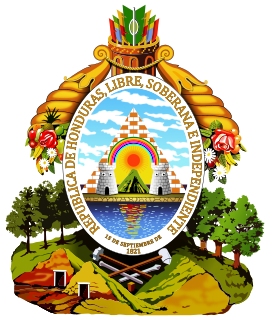
Politics of Honduras takes place in a framework of a multi-party system presidential representative democratic republic. The President of Honduras is both head of state and head of government. Executive power is exercised by the government. Legislative power is vested in the National Congress of Honduras. The party system is dominated by the conservative National Party of Honduras and the Liberal Party of Honduras. The Judiciary is independent of the executive and the legislature.

Honduras is divided into 18 departments. Each department is headed by a governor, who is appointed by the President of Honduras. The governor represents the executive branch in the region in addition to acting as intermediary between municipalities and various national authorities; resolves issues arising between municipalities; oversees the penitentiaries and prisons in his department; and regularly works with the various Secretaries of State that form the President's Cabinet. To be eligible for appointment as governor, the individual must a) live for five consecutive years in the department; b) be Honduran; c) be older than 18 years of age and; d) know how to read and write.
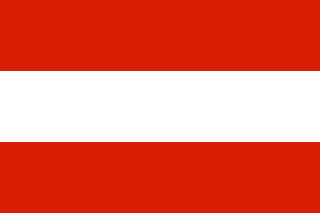
The Liberal Party of Honduras is a centrist liberal political party in Honduras that was founded in 1891. It is the oldest extant political party in the country, and one of the two main parties that have until recently dominated Honduran politics. The party is a member of the Liberal International. The PLH is identified with the color red and white, as the flag Francisco Morazán used in most of his military campaigns during time of the Central American Federal Republic.
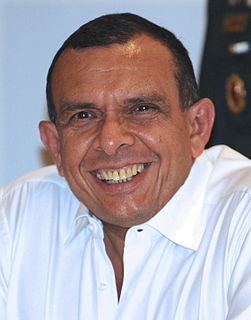
Porfirio Lobo Sosa, known as Pepe Lobo, is a Honduran politician and agricultural landowner who served as President of Honduras from 2010 to 2014. A member of the conservative National Party and a former deputy in the National Congress of Honduras from 1990, he was president of the National Congress of Honduras from 2002 to 2006. He came second to Manuel Zelaya with 46% of the vote in the 2005 general election. After the military ousted Zelaya in a coup d'état, Lobo was elected president in the 2009 presidential election and took office on 27 January 2010.

Honduras National Congress has 128 members (diputados); they serve four-year terms.
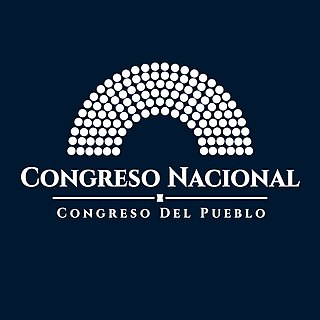
The National Congress is the legislative branch of the government of Honduras.

Carlos Roberto Flores Facussé was President of Honduras from 27 January 1998 to 27 January 2002 and President of the National Congress from 25 January 1994 to 25 January 1998.
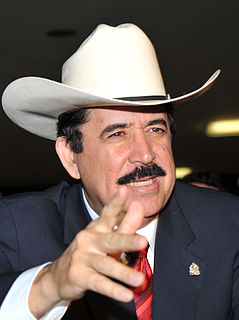
José Manuel Zelaya Rosales is a Honduran politician who serves as the First Gentleman of Honduras from January 2022. He was President of Honduras from 27 January 2006 until 28 June 2009. He is the eldest son of a wealthy businessman, and inherited his father's nickname "Mel". Before entering politics he was involved in his family's logging and timber businesses.

Liga Betcris de Honduras is the highest division of football in Honduras. The league season is divided into Opening (autumn) and Closing (spring). One team is relegated to the Liga de Ascenso and one team is promoted from Liga de Ascenso. The top four clubs participate in play-offs to decide the champion. The winners of the Opening and Closing competitions participate in the CONCACAF Champions League.

Iris Xiomara Castro Sarmiento is a Honduran politician who is the 56th president of Honduras. She took office on 27 January 2022. She is the country's first female president, as well as the first president not to be a member of either the Liberal Party or the National Party since democracy was restored in 1982.
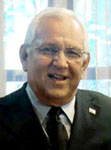
Roberto Micheletti Baín is a Honduran politician who served as the interim de facto president of Honduras from 28 June 2009 to 27 January 2010 as a result of the 2009 Honduran coup d'état. The Honduran military ousted the President, and the National Congress read a letter of resignation, which was refuted two minutes later by Zelaya in conversation with CNN en Español; days later, the coup-plotters claimed that the Supreme Court had ordered to forcefully detain President Manuel Zelaya because "he was violating the Honduran constitution"; Zelaya was exiled rather than arrested. Micheletti, constitutionally next in line for the presidency, was sworn in as president by the National Congress a few hours after Zelaya was sent into exile by the Honduran military. He was not acknowledged as de jure president by any government or international organization. The 2009 General Election took place as planned in November and elected Porfirio Lobo Sosa to succeed Micheletti.

The president of Honduras officially known as the President of the Republic of Honduras, is the head of state and head of government of Honduras, and the Commander-in-chief of the Armed Forces. According to the 1982 Constitution of Honduras, the Government of Honduras consists of three branches: Executive, Legislative and Judicial. The president is the head of the Executive branch, their primary duty being to "Execute and enforce the Constitution, treaties and conventions, laws and other legal dispositions." The President is directly elected for a four year term.

The Political Constitution of the Republic of Honduras was approved on 11 January 1982, published on 20 January 1982, amended by the National Congress of Honduras 26 times from 1984 to 2005, and 10 interpretations by Congress were made from 1982 to 2005. It is Honduras' twelfth constitution since independence in 1838. Previous charters were adopted in 1839, 1848, 1865, 1873, 1880, 1894, 1906, 1924, 1936, 1957 and 1965.

The Supreme Court of Honduras is the Supreme Court and Constitutional Court of Honduras. The Supreme Court is the highest judicial authority in Honduras.

The 2009 Honduran coup d'état, part of the 2009 Honduran constitutional crisis, occurred when the Honduran Army on 28 June 2009 followed orders from the Honduran Supreme Court to oust President Manuel Zelaya and send him into exile. Zelaya had attempted to schedule a non-binding poll on holding a referendum on convening a constituent assembly to rewrite the constitution. Zelaya refused to comply with court orders to cease, and the Honduran Supreme Court issued a secret warrant for his arrest dated 26 June. Two days later, Honduran soldiers stormed the president's house in the middle of the night and detained him, forestalling the poll. Instead of bringing him to trial, the army put him on a military aeroplane and flew him to Costa Rica. Later that day, after the reading of a resignation letter of disputed authenticity, the Honduran Congress voted to remove Zelaya from office, and appointed Speaker of Congress Roberto Micheletti, his constitutional successor, to replace him. It was the first coup to occur in the country since 1978.

Juan Orlando Hernández Alvarado is a Honduran politician who was President of Honduras from 27 January 2014 to 27 January 2022.

The Republic of Honduras is organized according to Title I: On the State of the Honduran Constitution of 1982. According to Title V: Branches of the Government, the three administrative branches are the legislative, executive and judicial. The legislative branch is the Congress of Deputies, which is elected by direct vote. Executive power is held by the president or, in the event of their death, by the vice-president. The judicial branch is composed of a supreme court, a court of appeals and other courts specified by the law.
The Military ranks of Honduras are the military insignia used by the Armed Forces of Honduras.
Luis Rolando Redondo Guifarro is a Honduran politician and engineer, serving as deputy and president of the National Congress of Honduras since 25 January 2022.